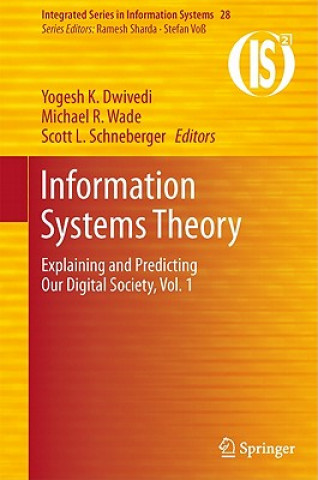
Kód: 01423905
Information Systems Theory
Autor Yogesh K. Dwivedi, Michael R. Wade, Scott L. Schneberger
The overall mission of this book is to provide a comprehensive understanding and coverage of the various theories and models used in IS research. Specifically, it aims to focus on the following key objectives: §To describe the var ... celý popis
- Jazyk:
 Angličtina
Angličtina - Vazba: Pevná
- Počet stran: 502
Nakladatelství: Springer-Verlag New York Inc., 2011
- Více informací o knize

7468 Kč

Skladem u dodavatele v malém množství
Odesíláme za 12-15 dnů
Potřebujete více kusů?Máte-li zájem o více kusů, prověřte, prosím, nejprve dostupnost titulu na naši zákaznické podpoře.
Přidat mezi přání
Mohlo by se vám také líbit
-

Memories of Envy
266 Kč -

Swift's Parody
2959 Kč -

Resurrection of Ireland
3328 Kč -

Analysis on Lie Groups
3186 Kč -

History of Afro-Hispanic Language
3130 Kč -

Stone Collector Book 1
379 Kč -

Advances in Databases
1314 Kč -

Computational Intelligence in Bioinformatics
5065 Kč -

Palookaville
515 Kč -

Fundamental Approaches to Software Engineering
1681 Kč -

The Storm
506 Kč -

Impact of Federal Investment on Hydrogen and Fuel Cell Technologies
868 Kč -

Miles McHale, Tattletale
450 Kč -

Pious Seductress
5170 Kč -

Coastal Zone Management Imperative for Maritime Developing Nations
7468 Kč -

Desolation and Enlightenment
3401 Kč -

Russian Decorative Arts
1830 Kč -

Tenjo Tenge (Full Contact Edition 2-in-1), Vol. 11
331 Kč -

Life Cycles
3576 Kč -

Zur Problematik der Veranstalterhaftung bei Events
1152 Kč -

Hamlet
660 Kč -

Cartulaires Francais en Angleterre
995 Kč -

Naturwissenschaftliche Einfuhrung in Die Bakteriologie
2087 Kč -

Psychologische Aspekte in der Traditionellen Chinesischen Medizin
688 Kč -

Weltgeschichte von der Vorzeit bis heute
730 Kč -

Der Traum
410 Kč -

Die Sonate
643 Kč -

Posttraumatische Belastungsstörung, m. CD-ROM
1039 Kč -

Ahoj, hádanka!
210 Kč -

Fernerkundung in Kustengebieten
986 Kč -

Ibsen als Norweger und Europäer
1099 Kč -

Der Wandel weltwirtschaftlicher Institutionen.
1792 Kč -

Himmelreich
352 Kč -

Hermeneutische Theologie - heute?
3210 Kč -

BON Praha - rusky
197 Kč
Darujte tuto knihu ještě dnes
- Objednejte knihu a zvolte Zaslat jako dárek.
- Obratem obdržíte darovací poukaz na knihu, který můžete ihned předat obdarovanému.
- Knihu zašleme na adresu obdarovaného, o nic se nestaráte.
Více informací o knize Information Systems Theory
Nákupem získáte 747 bodů
 Anotace knihy
Anotace knihy
The overall mission of this book is to provide a comprehensive understanding and coverage of the various theories and models used in IS research. Specifically, it aims to focus on the following key objectives: §To describe the various theories and models applicable to studying IS/IT management issues. To outline and describe, for each of the various theories and models, independent and dependent constructs, reference discipline/originating area, originating author(s), seminal articles, level of analysis (i.e. firm, individual, industry) and links with other theories. To provide a critical review/meta-analysis of IS/IT management articles that have used a particular theory/model.To discuss how a theory can be used to better understand how information systems can be effectively deployed in today s digital world. This book contributes to our understanding of a number of theories and models. The theoretical contribution of this book is that it analyzes and synthesizes the relevant literature in order to enhance knowledge of IS theories and models from various perspectives. To cater to the information needs of a diverse spectrum of readers, this book is structured into two volumes, with each volume further broken down into two sections. §The first section of Volume 1 presents detailed descriptions of a set of theories centered around the IS lifecycle, including the Success Model, Technology Acceptance Model, User Resistance Theories, and four others. The second section of Volume 1 contains strategic and economic theories, including a Resource-Based View, Theory of Slack Resources, Portfolio Theory, Discrepancy Theory Models, and eleven others. §The first section of Volume 2 concerns socio-psychological theories. These include Personal Construct Theory, Psychological Ownership, Transactive Memory, Language-Action Approach, and nine others. The second section of Volume 2 deals with methodological theories, including Critical Realism, Grounded Theory, Narrative Inquiry, Work System Method, and four others.§Together, these theories provide a rich tapestry of knowledge around the use of theory in IS research. Since most of these theories are from contributing disciplines, they provide a window into the world of external thought leadership.The overall mission of this book is to provide a comprehensive understanding and coverage of the various theories and models used in IS research. Specifically, it aims to focus on the following key objectives: §To describe the various theories and models applicable to studying IS/IT management issues. To outline and describe, for each of the various theories and models, independent and dependent constructs, reference discipline/originating area, originating author(s), seminal articles, level of analysis (i.e. firm, individual, industry) and links with other theories. To provide a critical review/meta-analysis of IS/IT management articles that have used a particular theory/model.To discuss how a theory can be used to better understand how information systems can be effectively deployed in today s digital world. This book contributes to our understanding of a number of theories and models. The theoretical contribution of this book is that it analyzes and synthesizes the relevant literature in order to enhance knowledge of IS theories and models from various perspectives. To cater to the information needs of a diverse spectrum of readers, this book is structured into two volumes, with each volume further broken down into two sections. §The first section of Volume 1 presents detailed descriptions of a set of theories centered around the IS lifecycle, including the Success Model, Technology Acceptance Model, User Resistance Theories, and four others. The second section of Volume 1 contains strategic and economic theories, including a Resource-Based View, Theory of Slack Resources, Portfolio Theory, Discrepancy Theory Models, and eleven others. §The first section of Volume 2 concerns socio-psychological theories. These include Personal Construct Theory, Psychological Ownership, Transactive Memory, Language-Action Approach, and nine others. The second section of Volume 2 deals with methodological theories, including Critical Realism, Grounded Theory, Narrative Inquiry, Work System Method, and four others.§Together, these theories provide a rich tapestry of knowledge around the use of theory in IS research. Since most of these theories are from contributing disciplines, they provide a window into the world of external thought leadership.The overall mission of this book is to provide a comprehensive understanding and coverage of the various theories and models used in IS research. Specifically, it aims to focus on the following key objectives: §To describe the various theories and models applicable to studying IS/IT management issues. To outline and describe, for each of the various theories and models, independent and dependent constructs, reference discipline/originating area, originating author(s), seminal articles, level of analysis (i.e. firm, individual, industry) and links with other theories. To provide a critical review/meta-analysis of IS/IT management articles that have used a particular theory/model.To discuss how a theory can be used to better understand how information systems can be effectively deployed in today s digital world. This book contributes to our understanding of a number of theories and models. The theoretical contribution of this book is that it analyzes and synthesizes the relevant literature in order to enhance knowledge of IS theories and models from various perspectives. To cater to the information needs of a diverse spectrum of readers, this book is structured into two volumes, with each volume further broken down into two sections. §The first section of Volume 1 presents detailed descriptions of a set of theories centered around the IS lifecycle, including the Success Model, Technology Acceptance Model, User Resistance Theories, and four others. The second section of Volume 1 contains strategic and economic theories, including a Resource-Based View, Theory of Slack Resources, Portfolio Theory, Discrepancy Theory Models, and eleven others. §The first section of Volume 2 concerns socio-psychological theories. These include Personal Construct Theory, Psychological Ownership, Transactive Memory, Language-Action Approach, and nine others. The second section of Volume 2 deals with methodological theories, including Critical Realism, Grounded Theory, Narrative Inquiry, Work System Method, and four others.§Together, these theories provide a rich tapestry of knowledge around the use of theory in IS research. Since most of these theories are from contributing disciplines, they provide a window into the world of external thought leadership.
 Parametry knihy
Parametry knihy
Zařazení knihy Knihy v angličtině Economics, finance, business & management Business & management Business mathematics & systems
7468 Kč
- Plný název: Information Systems Theory
- Podnázev: Explaining and Predicting Our Digital Society, Vol. 1
- Autor: Yogesh K. Dwivedi, Michael R. Wade, Scott L. Schneberger
- Jazyk:
 Angličtina
Angličtina - Vazba: Pevná
- Počet stran: 502
- EAN: 9781441961075
- ISBN: 1441961070
- ID: 01423905
- Nakladatelství: Springer-Verlag New York Inc.
- Hmotnost: 898 g
- Rozměry: 240 × 160 × 36 mm
- Datum vydání: 20. September 2011
Oblíbené z jiného soudku
-

The Phoenix Project
490 Kč -

Art of the Steal
422 Kč -

Technical Analysis Explained, Fifth Edition: The Successful Investor's Guide to Spotting Investment Trends and Turning Points
2025 Kč -

Business Intelligence: A Managerial Approach, Global Edition
2182 Kč -

Beginning Apache Spark Using Azure Databricks
1179 Kč -

Truth Machine
437 Kč -

Enterprise Architecture at Work
2643 Kč -

Management by Business Process
3313 Kč -

Beginning DAX with Power BI
1271 Kč -

Mastering Microsoft Power BI
1556 Kč -

Fundamentals of Business Process Management
1732 Kč -

Business Math For Dummies
483 Kč -

Study Guide for Technical Analysis Explained Fifth Edition
1684 Kč -

Production-Ready Microservices
1028 Kč -

Information Systems Today: Managing the Digital World, Global Edition
1849 Kč -

Business Statistics For Dummies
743 Kč -

Digital Influence
1007 Kč -

Deploying SharePoint 2016
2720 Kč -

SAP S/4HANA Conversion
1184 Kč -

Basic Business Statistics, Global Edition
1813 Kč -

Marketing Data Science
1979 Kč -

Digitalization in Healthcare
1977 Kč -

Study Guide for Technical Analysis Explained
813 Kč -

Getting Started with Grafana
1830 Kč -

Digitalization
1977 Kč -

Azure Automation Using the ARM Model
772 Kč -

Getting Started with Data Science
987 Kč -

Pro SAP Scripts, Smartforms, and Data Migration
1862 Kč -

Essentials of Licensing Intellectual Property
1043 Kč -

Economist Numbers Guide 6th Edition
464 Kč -

Intelligent Methods and Big Data in Industrial Applications
5094 Kč -

Explorations With Texas Instruments TI-85
2458 Kč -

Handbook on Decision Support Systems 2
6578 Kč -

Social Commerce
2942 Kč -

AI in Marketing, Sales and Service
1425 Kč -

Process Mining Handbook
1533 Kč -

Building Decentralized Trust
4204 Kč -

Building an Enterprise Architecture Practice
3907 Kč -

Unleashing the Power of IT, Second Edition - Bringing People, Business, and Technology Together
1153 Kč -

Managing IT Projects
1406 Kč -

Machine Learning in Finance
3611 Kč -

Statistics for Business and Economics, Global Edition
2579 Kč -

Practical Web Scraping for Data Science
1862 Kč -

Business Process Management
2571 Kč -

Dark Web
5094 Kč -

Cybersecurity
5391 Kč -

Build Your Own Blockchain
2126 Kč -

Process Management
4204 Kč -

Ackoff's Best
1491 Kč
Osobní odběr Praha, Brno a 12903 dalších
Copyright ©2008-24 nejlevnejsi-knihy.cz Všechna práva vyhrazenaSoukromíCookies


 Vrácení do měsíce
Vrácení do měsíce 571 999 099 (8-15.30h)
571 999 099 (8-15.30h)